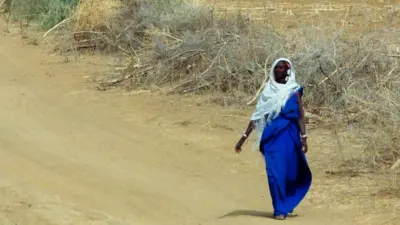We've updated our Privacy and Cookies Policy
We've made some important changes to our Privacy and Cookies Policy and we want you to know what this means for you and your data.
Libraries at risk of cuts despite 'unprecedented' rise in users
- By Caroline Davies
- Business correspondent, BBC News
Community libraries are seeing an "unprecedented" rise in the number of people using their services, but many are concerned about their future.
The rise in the cost of living has seen people turn to libraries to save putting the heating on at home, with some services hosting food banks.
But soaring costs could force some to make "drastic cuts" and even shut next year, said charity Libraries Connected.
A body representing councils said budget cuts were inevitable.
"No council wants to reduce library services, but the dramatic increase in inflation alongside increases to the National Living Wage and higher energy costs has added at least £2.4bn in extra costs onto the budgets councils set in March this year," said Gerald Vernon-Jackson of the Local Government Association (LGA), which represents local authorities in England and Wales.
Households across the UK have been hit by rising prices, with the costs of food, fuel and energy all soaring this year.
'Nowhere to turn'
Libraries Connected, which represents libraries in England, Wales and Northern Ireland, says many libraries have expanded their services to help people struggling with higher prices - running food banks, giving out clothing donations, extending their opening hours and providing hot drinks.
One is Gainsborough Community Library in Ipswich, which is selling cut-price bags of fruit and vegetables for £2 and has seen its sales almost double since the summer.
Pensioner Mick Cathles, who buys the bags, told the BBC his and his wife's pensions were not enough to survive on.
"You want to be able to manage on your own without help from anybody, but it comes to the stage when you don't have a choice. You just don't know where you're going to turn to," he says.
Isobel Hunter, the chief executive of Libraries Connected, says there has been a "range of people" attending libraries in recent months - from pensioners and younger people, to those working at home "who can't afford to heat their homes, but haven't necessarily got an office".
Many libraries, which are funded by local councils, do not know what their budgets will be for next year. However, Libraries Connected says that its members that do know are already considering cutting staff, services and the number of books they stock, with some even contemplating closure.
"The scale of the savings that libraries need to make and also the impact of inflationary costs means that these aren't savings that can be found down the back of the sofa or trimming little bits here and there," Ms Hunter says.
"It is a really serious situation."
At present, councils in England must hold a referendum if they want to increase council tax by more than 3%, but in his Autumn Statement on Thursday the chancellor said he would raise this to 5%.
Even with this change, Libraries Connected says council tax on its own is not a long-term solution for funding public libraries. Instead it argues that what is needed is a change to the way councils are funded.
The charity believes the chancellor's announcement will lead to cuts in funding for libraries and other frontline services.
'Cut at their peril'
Libraries in Scotland are also seeing far greater numbers coming in, says Pam Tulloch of the Scottish Library and Information Council, which supports local libraries.
She says libraries have a "long history of being busier" during difficult economic times, but like every public service they will have to find ways to make efficiencies as the economy slows down.
"But libraries are the most popular service local government provide in Scotland," she says. "Councils know they cut that at their peril."
At Nantwich Library in Cheshire, members have been making winter warmer kits for the elderly, which will be handed out at the local GP surgery.
But some of the group are growing increasingly worried about how they will stay warm themselves this winter.
"Eating's more important than heating at the moment so I shall definitely be sat there with my dressing gown wrapped over me and a good thick duvet," says Ann Eastes. "It's going to be a tough winter."
Nantwich says demand for its services has soared, with more children attending their after-school clubs and more adults attending their free events. The library's office has boxes of canned vegetables, fruit and cereals as it serves as an emergency food bank pick-up point.
"I've worked in libraries for 38 years and we've not seen the numbers of people, the broad cross-section of people who will tell us they are struggling," says Joanne Shannon, library services manager at Cheshire East Council, who manages 16 libraries and a mobile rural service.
"Some people think of some of the areas in Cheshire as very leafy and affluent, but we do have rural poverty. We've got a limited number of resources to give out and they are for extreme cases, but we see so many people who are telling us they are worried. How do we start to prioritise?"
In Suffolk, Bruce Leeke, who is in charge of libraries in the county, says the cost of running 45 sites has increased a lot, "from our energy costs to our cleaning".
"We will have to look next year at how we run the service. We are very concerned," he says.
The LGA said to save libraries, councils would require "adequate funding, in line with inflation and the demand for services".
The government said it understood the pressures councils were under, was "working closely with them to ensure public vital services are protected", and had made "an additional £3.7bn available to councils across the country".
It said libraries have a "unique and precious role" in communities, adding "councils have a statutory duty to provide a comprehensive and efficient library service".
The provisional Local Government Finance Settlement for 2023-24 is expected to be published this winter.
Top Stories
Features & Analysis
Most read
Content is not available








